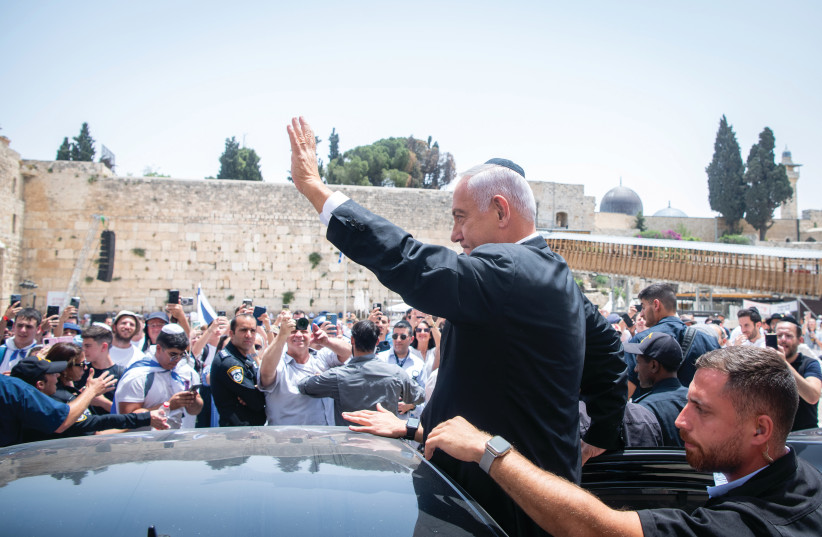Of all the characterizations of Tisha Be’av, the term “bittersweet” – combining pleasure alloyed with pain – comes close to today’s observance of the destruction of the First and Second Temples. But what kind of pleasure, what kind of pain?
Those who observe the occasion by fasting and praying at the Western Wall, some spending overnight at the Kotel (as it is called in Hebrew), apparently derive pleasure from fulfilling the mitzvah of remembering the alleged glory of our first and second commonwealths, and pain from their destruction.
There are also those who observe the day by visiting the Western Wall site in commemoration of historic changes in Jewish history, in a secular expression of solidarity. They may take pleasure from the many successes of the Zionist renaissance of Jewish sovereignty, while suffering the many pains of its failures.
While some Israelis of both persuasions observe the day in their fashion, most do not. For them, the Ninth of Av passes as just another day, business as usual. Sirens do not sound, drivers do not stop their cars, get out and stand in silence for a moment, as on Remembrance Day for the Fallen – soldiers, not edifices.
Perhaps the term “sweetbitter” better describes the evolution of Tisha Be’av from pleasure to pain. Consider the initial joy of a new immigrant at seeing and touching the Wall for the first time, in 1968 on the first anniversary of the Six Day War, and the ongoing pain of politicization that denies equal access to all Jews, female and male, to this supremely national site.

I felt that joyous surge for the first and last time in the summer of ‘68, keeping up with a line of impatient people pushing their way through the narrow Old City streets till we burst through at the new plaza next to the Western Wall. I felt an immediate adrenalin charge: I was the first person in my family to complete the cycle of destruction, exile and redemption. It was a lofty thought: I had discovered the true meaning of Zionism.
In practical terms, this meant I was faced with a choice: to continue living in the Diaspora as if Israel did not exist or to enter Jewish history as an actor, by making aliyah. That is the challenge of identity that Israel poses to every Jew born since 1948, after the establishment of the State of Israel.
Diaspora Jews and Zionism
BEFORE ISRAEL’S hard-won statehood, Diaspora Jews had the luxury of remaining lovers of Zion from afar. But those born into a world where the Jewish state exists cannot ignore the existential choice that statehood poses. Do I accept my birth in the US Diaspora as given, or do I consider joining the great Zionist experiment in Jewish sovereignty?
Living in Israel for the past 50 years, I have witnessed many observances of Tisha Be’av and happier holidays at the Western Wall, as well as the regular daily attendance of worshipers and tourists. I did so by serving eight months of my 21 years of IDF reservist duty in the unit formerly responsible for the security of the Western Wall.
This was an era before the construction of the elaborate entrance gateways, when miluimniks assigned to the Western Wall could park overnight at the ongoing construction site. Our guard posts were shabbily constructed, tiny huts that leaked when it rained.
Next to our rifles, our electric space heaters were our treasured companions. Until the night that all the unit’s heaters came on at the same time and short-circuited the Western Wall. We were suddenly left in the dark and cold, while an emergency generator restored the current for the Wall only.
This aroused much angry response among us guardians of the walls, focusing on the apparent discrimination in electricity favoring the worshiping patrons over the soldiers assigned to protect them. The incident led to much reflection over the separation of religion and state, and the one egregious difference between the US and Israel: The former wisely established this separation at its founding in 1776, while the latter has yet to fulfill the promise of religious freedom proclaimed in its Declaration of Independence.
That is why the United States is a true democracy, while Israel advertises itself as a “Jewish democracy” that is, in practice, a quasi-liberal theocracy, whose citizens are subject to the undemocratic rule of the Chief Rabbinate over such intimate personal matters such as conversion and marriage.
Some interpret the meaning of Tisha Be’av in its traditional context. A different view considers the twice destruction of the temples as an irrefutable hint from God that state worship inevitably leads to worship of the state religion. Freedom of religion is the freedom not to worship the state religion.
In that regard, the upside of the Second Temple’s destruction was the decentralization of Jewish worship, which survived sacrificial cult observance and flourished through the evolution of synagogue prayer. No more high priests and bloody animal sacrifice, just a minyan.
The writer is a former chief copy editor and editorial writer at The Jerusalem Post. His novel, The Flying Blue Meanies, is available on Amazon.
